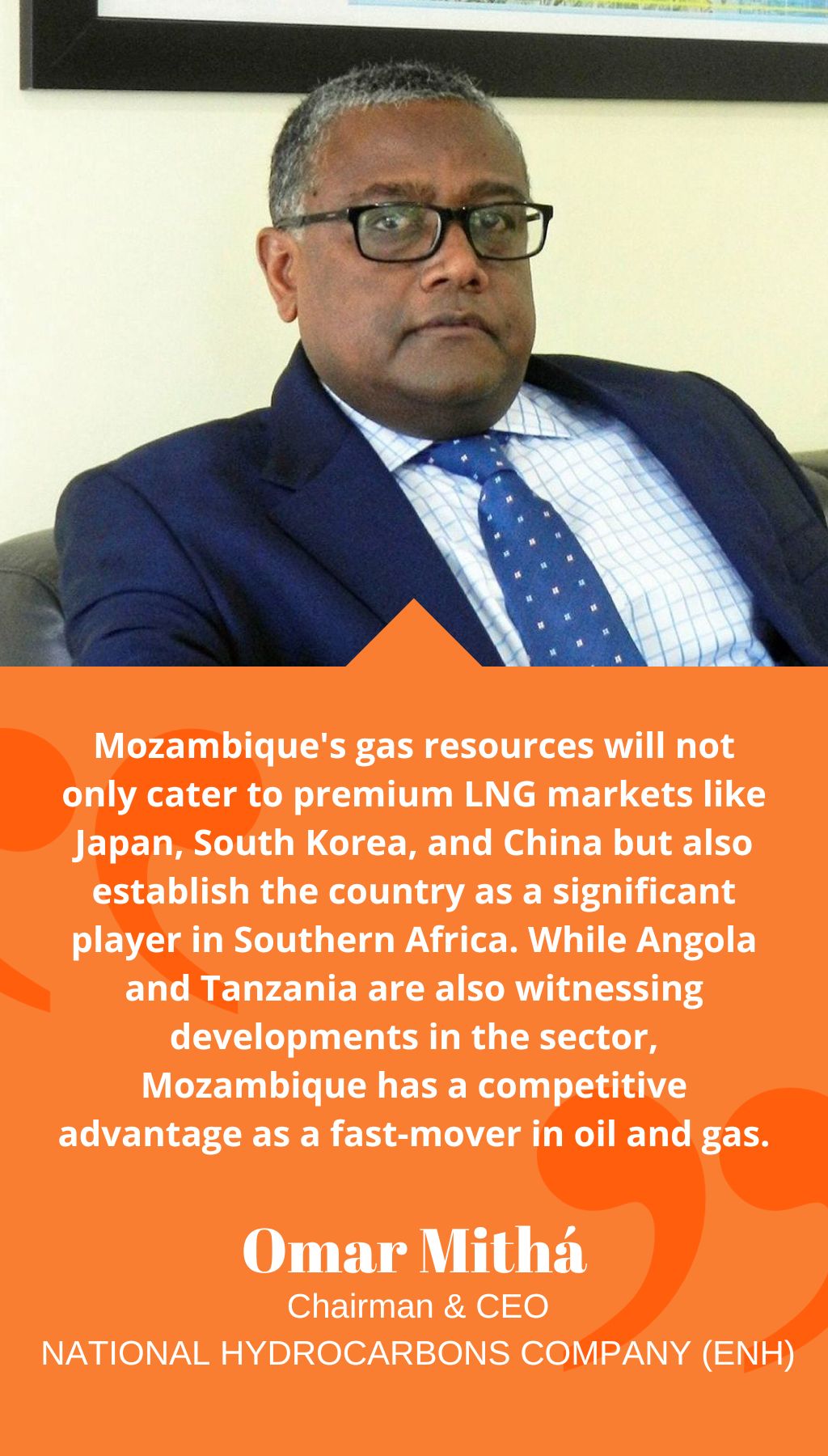
- Mozambique | 10 October 2020

Can you provide some background information about ENH?
Certainly. ENH is the state-owned enterprise that represents the government’s commercial interests in Mozambique’s oil and gas sector. We have a stake of between 10% and 25% or 30% in bidding processes, depending on negotiations. Our mandate extends along the value chain, and we act as aggregators for domestic gas and all hydrocarbons produced in Mozambique.
How will the upcoming gas developments change Mozambique’s economy?
The gas developments are expected to bring in more than US$50 billion, primarily from exports. This transformative influx of revenues will greatly impact the country’s fate, strengthening the government’s financial position and its ability to implement socioeconomic programs. Mozambique has a diversified economy, and the government intends to utilize these resources to bolster sectors such as agriculture, tourism, and transportation. Additionally, Mozambique’s strategic location as a gateway to land-locked countries like Malawi, Tanzania, and Zimbabwe positions it as a key player in Southern Africa.
How will Mozambique benefit from supplying LNG to premium markets and becoming a key player in Southern Africa?
Mozambique’s gas resources will not only cater to premium LNG markets like Japan, South Korea, and China but also establish the country as a significant player in Southern Africa. While Angola and Tanzania are also witnessing developments in the sector, Mozambique has a competitive advantage as a fast-mover in oil and gas. Despite the expected growth of renewable energies, oil and gas will continue to play a crucial role for at least the next four decades. Mozambique’s current developments will position it vis-à-vis its neighboring countries, as well as the islands in the Indian Ocean, enabling the country to offer services like bunkering for ships transitioning to LNG.
Did the sale of Anadarko affect the development of Area 1?
The agreement for the sale of Anadarko’s stake in Area 1 ensures that the commitments already made will be respected by the new operator. The project will continue as planned, with the financial closure expected next year. The entry of Total, a larger company with a better risk profile, is positive for Mozambique, as it attracts world-leading companies to invest and operate in the country.
What is the current status of the investment in Area 4?
We anticipate a light final investment decision (FID) in October, followed by a full-fledged FID by ExxonMobil in April 2020. ExxonMobil, the midstream operator, plans to build two large-scale trains with a capacity of 15.2 million tonnes per year. The project is progressing swiftly towards financial closure, positioning Mozambique as a major LNG exporter in the coming decade, with a production capacity of approximately 30 million tonnes per year.
How does ENH’s joint venture with Vitol contribute to these developments?
The joint venture, ENH Energy Trading, is strategically important for ENH as it allows us to connect the dots along the value chain. Vitol, a prominent independent trader based in Singapore, has an excellent track record and a strong presence in Africa. Through this partnership, ENH will gain valuable technology transfer and develop its trading segment. The concessions are on a build, operate, and transfer (BOT) basis, ensuring transparency and good governance between the upstream and trading company.
What are the prospects for Mozambique and the oil and gas industry in Africa?
Mozambique has set an example for other African countries in balancing nationalistic development objectives with the attraction of foreign investment. Creating a favorable environment is crucial for companies to invest billions of dollars in deep offshore projects. Some countries that emphasized local content excessively and delayed negotiations with international oil companies (IOCs) missed their opportunity. It’s essential to increase revenues through various means, such as income tax, royalties, and profit-sharing programs. Africa faces strong competition in the global oil and gas marketplace, with other regions like Qatar, the United States, Myanmar, Russia, and Australia also supplying these resources. Time to market is crucial in such a competitive landscape.
Furthermore, Mozambique aims to diversify its economy and maximize the participation of small and medium-sized enterprises (SMEs) in the value chain. This vision recognizes the importance of long-term economic development and ensuring that the population benefits from the sector’s growth. Although meeting the oil and gas sector’s requirements in terms of certifications and technology is challenging for SMEs, the government is committed to developing a strategy to integrate them into the value chain gradually.














